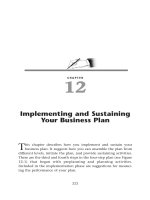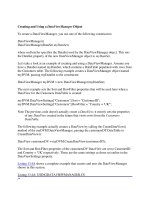CREATING AND IMPLEMENTING A STUDY PLAN
Bạn đang xem bản rút gọn của tài liệu. Xem và tải ngay bản đầy đủ của tài liệu tại đây (104.07 KB, 12 trang )
Creating and Implementing a Study Plan
77
Secret 6
C
REATING AND
I
MPLEMENTING
A
S
TUDY
P
LAN
J
anine had only three months left to study for the SAT
exam, and she was beginning to get anxious. There
was so much information to learn and review. How could
she possibly get it all done? Every time she thought
about the exam, she felt sick to her stomach.
During lunch, she mentioned her anxiety about the test
to her friend Nicole. “Even if I went without sleep and
meals for the next two months, I still couldn’t get it all
done,” she sighed.
“Oh, you’ll be fine,” said Nicole as she opened a can
of soda.
“Do you have any idea how many geometry formulas
there are? You have to know how to find the area and
volume of every shape known to man. And then there’s
the algebra. Quadratic equations, polynomials—”
“Poly-what?” asked Nicole.
“Polynomials,” Janine repeated. “And that’s just the
math. Don’t even get me started on the verbal.”
Nicole frowned. “It does sound like a lot.”
“That’s because it is a lot,” Janine explained. “This is
probably one of the most important tests we’ll ever take.
Have you started studying yet?” Nicole shook her head.
“Aren’t you nervous?” Janine asked.
“Now, I am,” Nicole sighed.
Like Janine and Nicole, we sometimes put off structured studying
because the task seems too big to handle. The idea of the SAT exam
or the ACT assessment can be overwhelming. However, you can make
any study schedule for a high stakes test manageable by creating a
study plan.
WHAT IS A STUDY PLAN?
Basically, a study plan is an agreement that you make with yourself
about how much time and energy you are going to devote to studying
for a major exam. This agreement is then broken down into manage-
able pieces to be tackled before test time.
Follow these four steps to creating a successful study plan for each of
your BIG exams coming up this year:
1. Get the correct information. Your first step is to find out as
much as you can about the exam. Get all the details about the
exam, including:
• When will it be held?
• Where will it be held?
• How do you register?
• When do you need to register?
• How much does it cost?
• What do you need to bring with you to the exam?
• What exactly will be tested on the exam? (What subjects? What
kinds of questions?)
2. Find out what you already know and what you need to learn.
To create an effective study plan, you need to have a good sense of
exactly what you need to study. Chances are you already know
some of the test material well. Some of it you may only need to
review, and some of it you may need to study in detail. If possible,
take a practice exam to find out how you would do on the actual
exam. How did you score? What do you seem to know well? What
do you need to review? What do you need to study in detail?
3. Set a time frame. Once you have a good sense of how much
studying is ahead, create a detailed study schedule. Use a calendar
to set specific deadlines. If deadlines make you nervous, give
78
10 SECRETS TO ACING ANY HIGH SCHOOL TEST
yourself plenty of time for each task; otherwise, you might have
trouble staying calm and keeping on track.
4. Break your studying into small chunks that will lead you to
your goal step by step. A study plan that says “Learn everything
by May 1” isn’t going to be helpful. However, a study plan that sets
dates for learning specific material in March and April will enable
you to learn everything by May 1. For example, if you have 3
months to focus on building your critical reading skills for the SAT
or ACT exam, you might create a schedule like the following:
As you set your deadlines, think carefully about your day-to-day
schedule. How much time can you spend on studying each week?
Exactly when can you fit in the time to study? Be sure to be realis-
tic about how much time you have and how much you can accom-
plish. Give yourself the study time you need to succeed.
5. Stick to your plan. Make sure you have your plan written on
paper and posted on the bulletin board in your room, on the refrig-
erator, or even in your locker. (Don’t just keep it in your head!)
Look at it regularly so that you can remember what and when to
study. Checking your plan regularly will also help you see how
much progress you have made along the way.
It’s very important that you don’t give up if you fall behind. Unex-
pected events may interrupt your plans. You may have to put in extra
time on the yearbook committee; you may have to deal with a prob-
lem at home, or you may even come down with the flu. Or it might
Creating and Implementing a Study Plan
79
Week 1 Review basic reading comprehension strategies. Start vocabulary list.
Week 2 Practice finding main idea and specific detail questions.
Week 3 Practice vocabulary in context questions.
Week 4 Practice inference questions and finding references in text.
Week 5 Take reading comprehension practice test.
Week 6 Begin reviewing grammar and usage rules. Start reading novel.
Week 7 Review vocabulary.
Week 8 Practice critical reading questions.
Week 9 Practice critical reading questions. Review vocabulary.
Week 10 Take practice test. Finish novel.
Week 11 Start overall review.
Week 12 Continue overall review and taper all week to test day on Saturday.
just take you longer to get through a task than you planned. That’s
okay. Stick to your schedule as much as possible, but remember that
sometimes life gets in the way.
For example, if you have a family problem that’s keeping you from
concentrating, you may need to postpone your studies to take care of
that problem. Just remember to reschedule your study time. Better to
study later when you can concentrate than to waste time “studying”
when you are unable to focus.
So, if you miss one of your deadlines, don’t despair; just pick up
where you left off. Try to squeeze in a little extra time during the
next few weeks to catch up. If that doesn’t seem possible, simply
adjust your schedule. Change your deadlines so that they are more
realistic. Just be sure you still have enough time to finish everything
before the exam.
Consider your study plan as a contract holding you to certain rules
for studying. Essentially, your study plan will put you on the fast track
for exam success, as well as provide you with answers to the whos,
whats, whens, and wheres of your study activities—the topics of the
rest of this chapter. As you may have guessed, the creation and imple-
mentation of a study plan fits hand in hand with successful time man-
agement. For that reason, you will benefit the most by referring to
Secret #1 after reading this chapter.
Note: Study plans are different than study schedules. Your study
schedule is for everyday school stuff; your study plan is for the BIG
EXAM!
SOURCES IN CYBERSP
SOURCES IN CYBERSP
ACE
ACE
Creating a Study Plan
•
www.columbia.edu/cu/augustine/study/schedule.html—Tips for
creating and implementing a study plan.
•
www.clt.cornell.edu/campus/learn/LSC%20Resources/
Studyguidelines.pdf—Guidelines for creating a study schedule
from Cornell University.
Because there are many variables included in study plans, and
because each test taker has unique needs and different time frames in
which to study, no two study plans will be the same. Bear in mind
80
10 SECRETS TO ACING ANY HIGH SCHOOL TEST
that the plan you create for the SAT exam is going to differ from the
plan you create for your state exit exams. Every time you begin to
think about a high stakes test, think first about starting a fresh study
plan. As you get ready to create your study plan, ask yourself these
important questions.
Who
Who does this study plan affect? Will you be studying independently,
with a study group or partner, or with a tutor?
Obviously, your study plan will include you, but are there others
who will be affected by the plan? You may be involved in a study
group or evening class that meets two times a week or on Saturday
mornings. Be sure to include this in your study plan. If you have a par-
ent or tutor assisting you as you prepare for a major test, note those
sessions in your study plan as well. Remember, anyone whose help
you depend on to help you with test preparation should be mentioned
in your plan. On a related note, do not arbitrarily include friends on
your study plan just because you think that you might study with them
sometimes. Only include those people with whom you know you will
be studying for your high stakes exam.
What
What are you going to be studying? How will you prioritize your
work? Create a list of all of the subject areas on the test that will
require your attention. The SAT exam has math and verbal sections;
the ACT exam has English, reading, science, and math sections;
Advanced Placement tests cover only one subject per exam, but you
may have two AP exams in one month, so you may wish to combine
them, for example, in an English–Calculus study plan.
Make some general decisions about which segments of the exam
require the largest portion of your study energy, and be sure that you
leave plenty of time for them in your schedule. For example, if you are
a math whiz, you may need to spend more time on your vocabulary
lists when studying for the SAT exam.
You may be faced with the dilemma of what to schedule and when.
How you prioritize your study time is as important as deciding which
topics to study. You know best when you are at your intellectual peak
and are most able to grasp and retain facts. You also know which subjects
Creating and Implementing a Study Plan
81









